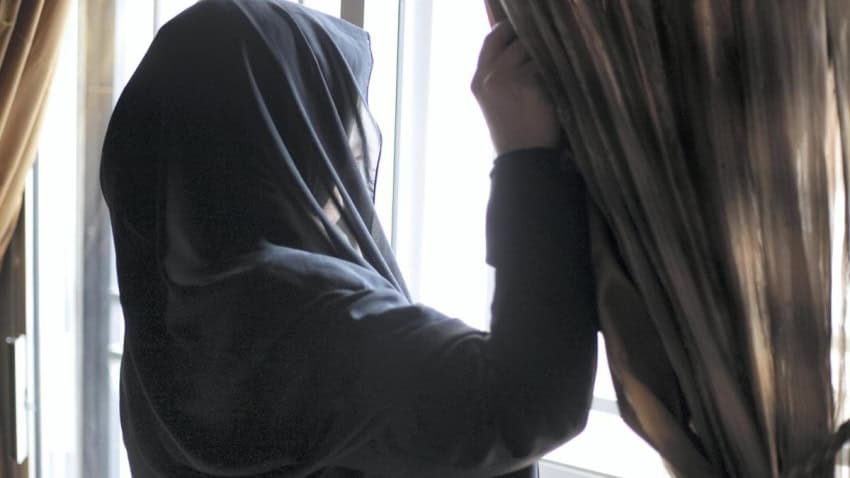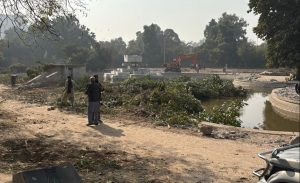Feature by Fatima Rehman, Shiza Farhan, Arbab Ibrahim, Mehma Khan, Zair Zaki and Tooba Hameed…
KARACHI – “I wish suicide was never a sin in our religion,” says 23-year-old Wazira, as she tries to hold back her tears, contemplating a desperate act to end her misery.
A young mother of five kids, she was abandoned by her husband and in-laws, and faces a social boycott over an ailment that is bred out of poverty and lack of timely medical care.
It’s been a year since the birth of her fifth child –a son – that she began suffering from constant leakage of urine with blood, occasionally accompanied by a foul odour. She is unable to move out of the house or attend weddings in her village. Her in-laws disowned her a year back when she first found herself incontinent right after she gave birth to her fifth son, whom she never saw again after she left her in laws. She now lives with her widow mother, two daughters as well as her sisters.
Like many women in Pakistan, Wazira is silently suffering from Obstetric Fistula – a medical condition in which a hole develops between the bladder and the vagina (sometimes rectum) during prolonged labour which can continue for days without timely medical intervention or Cesarean-section is the major risk factor. During this time, the soft tissues of the pelvis are compressed between the baby’s head and the mother’s pelvic bones. The lack of blood flow causes the tissue to die, creating a hole between the mother’s vagina and bladder or between the vagina and rectum, or both, resulting in urinary incontinence (leakage), almost always leading to social isolation and abandonment of its victims.
According to the USAID Fistula Care Plus report, Obstetric Fistula is caused due to obstructed labour and it is referred to as the most common form of genital fistula in developing countries including Pakistan which consist of an estimated 80-90% of all genital fistula cases. Often called ‘the poor woman’s disease’, the condition rarely gets any attention in the mainstream media, so much so that many women – even those afflicted by it – have not heard of its name.
The Number Game
Reports from Pakistan National Forum Women Health (PNFWH) suggest that almost 5,000 women every year are added to the list of obstetric fistula sufferers in the country.
Dubbed as the disease of the poor, fistula seems to be plaguing the lives of some of the most underprivileged women of the society. There are only 30 surgeons in Pakistan trained to cure the disease, while the number of women affected has remained almost the same. About 30,000 women die every year in the country due to ill-treatment and lack of resources.
However, expenditure on public health by the government remains to be at a mere 0.7% of the GDP as per a report published by the World Bank back in 2014. This not only raises questions about the lack of resources provided by the government but also creates problems for the women who give birth every single day, in miserable condition surrounded by poverty.
A project run by Pakistan National Forum on Women Health (PNFWH) and United Nations fund for People (UNFPA) has helped around 3,400 women since 2006 to get help in the country, treating 500-600 women every year. This year, PNFWH has collected $297,325 as funds to treat this disease.
Dr. Saman Imtiaz, researching gynaecologist at Koohi Goth Hospital in Karachi says the kinds and causes might have changed over the years but the numbers have been accelerating mainly because of the negligence at times from the patient or from the doctor fraternity.
Koohi Goth Hospital is a leading medical facility in the country treating fistula patients. Moreover, it is the only charity hospital in South Asia for the treatment of fistula where cases of obstetric fistula are tackled by leading urologists, gynaecologists and surgeons from the field.

While talking about rising numbers, Dr. Imtiaz also sheds light on how there are more cases reported from Sindh and Balochistan due to lack of medical facilitation centres especially for maternal care, in addition to those from Karachi, Hyderabad and other cities that were reported previously.
Cost of staying dry
The treatment cost of Fistula at private hospitals could range from Rs50,000 to Rs2,500,000 depending on the severity of the condition. Often, it is unaffordable for the patients since the ones suffering usually belong to the lowest socio-economic groups where generating Rs15,000 is a big deal.
“Routine fistula usually cost Rs40,000-50,000 in a periphery hospital. However, in hospitals like Aga Khan, it will cost about Rs200,000. A complicated fistula can cost up to Rs800,000,” Dr. Shershah revealed.
Can we end our fight with Obstetric Fistula?
Dr. Aziz Abdullah, a leading urologist and consultant at Liaquat National Hospital says we can surely end obstetric fistula in the same way New York won its battle against it back in 1960 and now they stand with almost no case reported for obstetric fistula by taking all required preventative measures.
He, however, observes that in Pakistan, our fight is not only against fistula but corruption, illiteracy and at times severe laxity from the patient’s side.
Dr. Abdullah, who has also been an active member of UNFPA’s fistula project in the past, says, “The disease of poor usually receives less attention over other issues since it is a comparatively less prolific business for doctors and like many other chronic developmental issues in our country, and has also suffered negligence from the government.”
But is that the case in the Constitution? Articles 9, 14 and 38(d) of Pakistan’s constitution state that it is the responsibility of the government to provide “affordable, accessible and quality maternal health services”. The performance of successive governments in this regard has been questionable and health has always been pretty low on the priority list.

Nevertheless, health used to be a federal matter but after the passage of the 18th Amendment, health has become a provincial subject. Now every provincial government holds responsibility for providing and maintaining quality healthcare services to its citizens.
In the past, the government’s role showed us a ray of hope when it initiated various projects including the National Maternal Newborn and Child Health Programme in 2006. These programmes called for improvements in maternal and newborn child health services at all district levels, including 24-hour comprehensive emergency obstetric care, training of community midwives, access to comprehensive family planning services and general awareness of maternal health services.
Parallel to this, one-year before the United Nations Fund for Population (UNPFA) started funding the obstetric fistula cases in 2005. Before that, very few people knew of the disease and the government had almost no policy or infrastructure for combating this ailment.
With the passage of time, UNFPA became the largest contributor to the cause. Unfortunately, it had to withdraw its funding for the project in 2016. The then country manager for UNFPA, Sajjad Siddique, had said that their organization had signed an MoU with the relevant ministry for 5 years and under the agreement the government was supposed to take over the project.
“It’s time that the Pakistan government owned these efforts and makes them a part of its health programme,” Mr. Siddique had said earlier.
“The funding for this project was discontinued only because of our resource limitations and other priorities under UNFPA country programme,” responded a spokesperson from UNFPA when approached.
A similar case came to the fore in 2015, when a survivor of the disease, Kiran Sohail, filed public interest litigation against the government of Sindh, through her attorney Sara Malkani, in the High Court of Sindh. Kiran argued in her petition that the government had failed to provide her affordable, accessible and quality maternal health services as enshrined in the constitution as well as the National Maternal Newborn and Child Health programmes.
In May 2017, almost after a decade after the fight against fistula was started in the country, a focal person for the health department informed the court that pieces of training are being given to gynaecologists in the affected areas and the government was trying to devise a mechanism to effectively control these diseases. The scourge of obstetric fistula was to have been eradicated in the developing world by 2015 in line with the Millennium Development Goals, to which Pakistan was also a signatory. However, there has been very little change in the number of reported cases in Pakistan and the program has proven to be inefficient at the end of the day.
In a broader spectrum, there are only eight hospitals in major cities like Karachi, Multan, Quetta and Lahore, which have the capacity to treat fistula cases, whereas most of the cases reported are from the rural areas. Patients have to reach big cities for minor operations, which could be easily treated in the rural towns by training and capacity building of the staff already available in the rural towns. All in all, the aid and awareness cannot reach out to the ones who need it the most in rural population.
Elephant in the room
Apart from government’s negligence in the cause, there are other factors involved in the fight against obstetric fistula that nobody wants to talk on. In Pakistan, the act of FGM (female genital mutilation) is practiced amongst select areas and communities – examples being the Bohra Muslims of Sindh and the Sheedi/Bilali community. In recent years, due to a rise in strict sect religious compliance, the practice of FGM has increased. However, the fact goes unnoticed that practice of FGM serves as a contributory factor to obstetric fistula in women. The anatomy of the female genital track becomes weak and distorted and there are more chances of fistula formation.
It goes uncontested and the medical lobby in Pakistan echoes the same. The prevalent social, political, and economic situation in Pakistan has an indirect role in the increased cases of obstetric fistula in Pakistani rural women. Issues of poverty, malnutrition, lack of education, early marriage, childbirth, polygamy, harmful traditional practices (FGM), sexual violence, and lack of good quality or accessible maternal and health care and limited awareness make Pakistan a perfect breeding ground for this physically and emotionally debilitating disease.
A fistula patient Rubina was admitted in the Lyari General Hospital. She was 14 years old when she got married and it was right after two months of her marriage that she got pregnant with her first child.
“I couldn’t get my baby but I did get a curse for life,” Rubina says, as she hoped that her misery would be over.
Other factors that lead up to the issue include the incapable functioning of organizations like IDSP (Institute for Development Studies and Practices Pakistan) that claims to provide the proper attention to strengthening family units, domestic violence, only maternal care which includes the project of midwifery and fistula and education blind individuals and eye-related diseases and treating them. The rest of the work is only done on the papers or on the website, with no evidence of any other work or training given by this organization. Recently, this organization was accused of corruption and mishandlings of allotted funds. The organization also had allegations of spoiling fistula cases as midwives treated most of them with little or no knowledge of the issue.
One of those midwives declined our calls and questions when approached in this regard. With this, role of midwives in the process of labor comes under the spotlight.
Apart from creating awareness and educating the people, the proper training of midwives is crucial to battle this issue as they are the first ones that come across any patient, especially to the affected part of the population. The use of C-sections at the right time to deliver a baby could help immensely in preventing obstructed labor. The US and Europe are great examples of how they eliminated fistula in the early 20th century by using C-sections when needed.
Midwife’s Role
A professionally trained midwife and lady health visitor (LHV) can ensure safe pregnancies and deliveries and can play an important role in preventing any complications that could lead to obstetric fistula. Midwives and LHVs can educate women to take better care of themselves. They can help educate women regarding family planning.
They can help remove the stigma that is associated with obstetric fistula by educating women and raising awareness. They need to have a sense of responsibility towards this issue and their role to prevent it. Immediate steps taken for professional training of midwives can save millions of lives as they are responsible for taking care of women throughout a pregnancy. An educated woman can take better care of her herself and avoid getting into such a life-shattering situation.
“Any country where midwives are empowered do not have fistula. Trained midwives are a blessing against maternal death and morbid,” says Dr. Shershah Syed, physician and surgeon, known for his work in obstetrics and maternal health
The absence of proper transportation, dilapidated roads and travelling long distances to proper health facilities causes further delay. This delay increases the compression on the soft pelvic organs and causes a uterine rupture because of which obstetric fistula develops and most of the time this results in the stillbirth of the baby.
The patients of obstetric fistula belong to the rural areas mostly and this is where 69% of the population of Pakistan resides. They don’t have enough knowledge and awareness to know the ways to avoid such a condition or where to get their treatment done.
“I went through two surgeries at Zainab Medical Centre before coming to Koohi Goth for treatment, Every time I was told that I won’t leak anymore but my case got worse,” says Razia, a fistula patient at Koohi Goth Hospital.

Suffering continues
A prominent number of women suffer the constant humiliating smell of urine and faeces. Since women living with obstetrical fistula experience a deep sense of loss that emotionally and mentally hurt them as women and wives, their social networks are broken and minimized. Nerve damage to the legs likewise can make it tough to walk. Affected women are usually divorced – rejected by their husband or partner, shunned by their community, stigmatized, and cursed for their condition.
“I don’t want my kids to get irritated with the foul smell and fall sick,” says Wazira’s husband who got married again after her disease. He could afford the expense of the new marriage but not Wazira’s fistula treatment.
A significant number of those women additionally don’t interact in any economically profitable activities, therefore, turning into an economic burden to society. Women who stay untreated may not only face a lifetime of shame and isolation, but may also additionally face a slow, premature death from infection and kidney failure.
Dr. Emaan khan, psychiatrist at Civil Hospital dished in on posttraumatic effects of fistula and said post-traumatic stress disorder (PTSD) is a psychological disorder which is commonly faced by obstetric fistula patients.
“It is basically the condition that is triggered by a terrifying event — either experiencing it or witnessing it. Symptoms may include flashbacks, nightmares and extreme depression and anxiety, also uncontrollable thoughts about the event. Obstetric fistula patients are treated to end this traumatic stress through psychotherapy and at times also treated with medications,” says Dr. Khan.
Where is the ship heading?
“The conventional statement of bringing a change will no more aid us in fighting and eradicating obstetric fistula but in addition we need the will of shaping our thought processes in a way that we top treating female genital issues as taboos, however, we need to face and battle with corruption in this matter, financial and moral both,” observed Dr. Abdullah.
The ship under discussion is, in reality, the hardship that women go through during the labor process in Pakistan due to numerous factors standing like huge stones in our way of handing a safe and healthy baby in the hands of a mother.
Meanwhile, Wazira, who is recovering at the Koohi Goth Hospital, feels that she deserves a chance at life and is optimistic. “All I want now from life is to offer my prayers again and meet my sons.”













